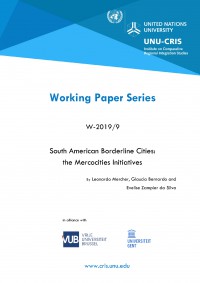South American Borderline Cities: the Mercocities Initiatives

The current processes of regional integration in South America require a reflection on the challenges that national States face in formulating and implementing border region public policies. Based on data collection about national borders in South America, it was possible to observe that individual cities started to play an important role in public policies for regional integration in comparison to their respective national governments. This might be a consequence of the absence of actions from national governments in border regions and may influence local governments to develop transnational policies to meet the demands of their populations and to assume the responsibilities that normally pertain to national governments. In order to understand these agents and how these new levels of government coordination change integration in borderlines, the following analysis were conducted by i) the scenario of borderlines cities in South America; ii) the cities networks present in South America; iii) and Mercocities Network as an explanatory variable in the multilevel governance in the current process of regional integration and borderlines agendas. The results show that, despite the existing shared knowledge about public policies among South-American cities, the Mercocities Network also changes the political dynamic in the region by transferring part of border integration responsibilities from national States to cities.
